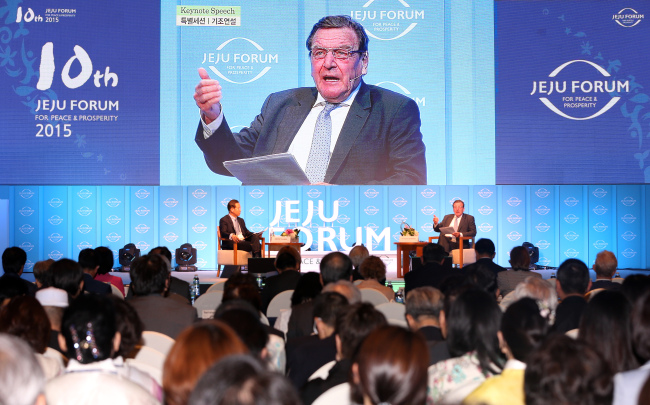JEJUDO ISLAND ― Leading politicians and scholars on Thursday urged Asian nations to strive harder to foster multilateral cooperation to defuse geopolitical tensions, create “forward-looking” relations among them and keep the region’s economic dynamism.
Former Canadian Prime Minister Joe Clark, former Indonesian leader Susilo Bambang Yudhoyono, former German Chancellor Gerhard Schroeder and other high-profile figures made their opening remarks at the 10th Jeju Forum for Peace and Prosperity.
The forum began its three-day schedule Wednesday to discuss a wide range of issues including North Korea’s nuclear problem, Korea’s reunification, maritime disputes in the South China Sea, and education and cultural exchanges.
 |
Former German Chancellor Gerhard Schroeder speaks during a session on Germany’s post-unification structural reforms at the 10th Jeju Forum for Peace and Prosperity on Jejudo Island onThursday. (Yonhap) |
The ex-Canadian leader stressed the need to capitalize on “middle-power” diplomacy to open fresh dialogues among the competing powers, help address their differences and, in turn, promote cooperation in the region beset by nationalism, security rivalries and historical disputes.
“Middle powers matter more today than we once did, because the tensions between dominant powers can lead them to narrow their focus, and often, therefore, to limit their capacity to lead or stimulate change,” Clark said.
“Middle powers, by contrast, often have much more flexibility in opening new dialogues, reaching across existing boundaries, and encouraging the skeptical or the constrained to explore new options,” he added.
Middle-power states refer to countries like South Korea, Canada and Australia, which have sufficient diplomatic credibility, status and economic power with which they can take collective action to make differences on global issues.
The ex-Indonesian leader called for “self-restraint and de-escalation” of tensions, underscoring the need to prevent regional conflicts from worsening, should the countries not be able to work out permanent resolutions to their conflicts.
Yudhoyono also said enhanced economic cooperation would contribute to easing the region’s geopolitical and military tensions.
“Geoeconomics tend to bring countries together through interdependence and connectedness. Geoeconomics bring more trade, investment, infrastructure, tourism and exchanges and others,” he said. “We need to make sure that the economic cooperation can help soften the rough geopolitical edges.”
Touching on Europe’s peace-building efforts, former German leader Schroeder said that enhanced regional cooperation and integration will help establish the basic foundation for peace and regional development.
In his lecture held prior to the opening ceremony, Schroeder spoke of the need for a “courageous, far-sighted” political leadership should South Korea want to envision a stable, successful post-unification era.
Sharing his experience in pushing for Agenda 2010 ― a series of bold structural reforms in Germany in the 2000s, which led to an electoral defeat ― Schroder said that a politician should be able to “take risks” to carry out challenging, unpopular policy initiatives should they help eventually promote long-term national interests.
By Song Sang-ho, Korea Herald correspondent (
sshluck@heraldcorp.com)








